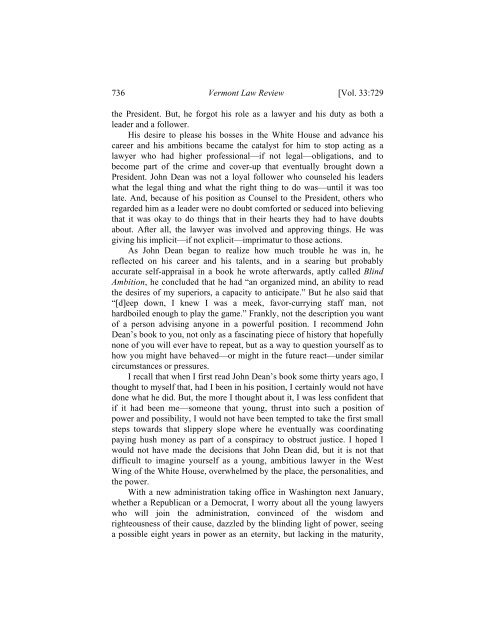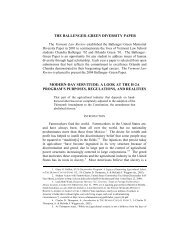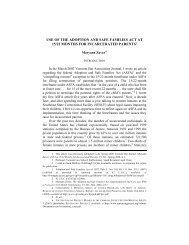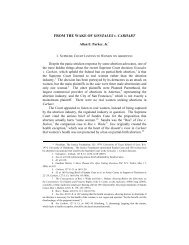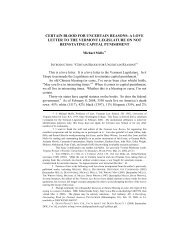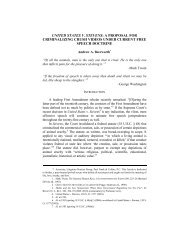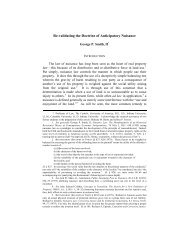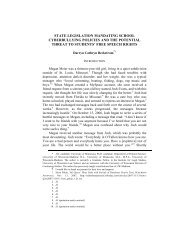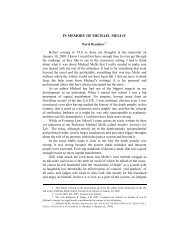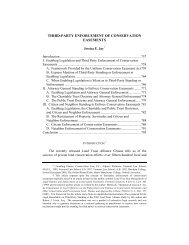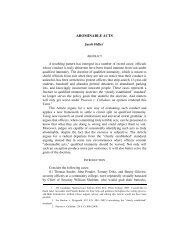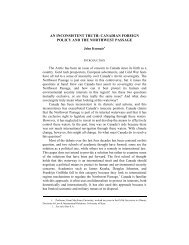The Organization Lawyer William B. Lytton - Law Review - Vermont ...
The Organization Lawyer William B. Lytton - Law Review - Vermont ...
The Organization Lawyer William B. Lytton - Law Review - Vermont ...
Create successful ePaper yourself
Turn your PDF publications into a flip-book with our unique Google optimized e-Paper software.
736 <strong>Vermont</strong> <strong>Law</strong> <strong>Review</strong> [Vol. 33:729the President. But, he forgot his role as a lawyer and his duty as both aleader and a follower.His desire to please his bosses in the White House and advance hiscareer and his ambitions became the catalyst for him to stop acting as alawyer who had higher professional—if not legal—obligations, and tobecome part of the crime and cover-up that eventually brought down aPresident. John Dean was not a loyal follower who counseled his leaderswhat the legal thing and what the right thing to do was—until it was toolate. And, because of his position as Counsel to the President, others whoregarded him as a leader were no doubt comforted or seduced into believingthat it was okay to do things that in their hearts they had to have doubtsabout. After all, the lawyer was involved and approving things. He wasgiving his implicit—if not explicit—imprimatur to those actions.As John Dean began to realize how much trouble he was in, hereflected on his career and his talents, and in a searing but probablyaccurate self-appraisal in a book he wrote afterwards, aptly called BlindAmbition, he concluded that he had “an organized mind, an ability to readthe desires of my superiors, a capacity to anticipate.” But he also said that“[d]eep down, I knew I was a meek, favor-currying staff man, nothardboiled enough to play the game.” Frankly, not the description you wantof a person advising anyone in a powerful position. I recommend JohnDean’s book to you, not only as a fascinating piece of history that hopefullynone of you will ever have to repeat, but as a way to question yourself as tohow you might have behaved—or might in the future react—under similarcircumstances or pressures.I recall that when I first read John Dean’s book some thirty years ago, Ithought to myself that, had I been in his position, I certainly would not havedone what he did. But, the more I thought about it, I was less confident thatif it had been me—someone that young, thrust into such a position ofpower and possibility, I would not have been tempted to take the first smallsteps towards that slippery slope where he eventually was coordinatingpaying hush money as part of a conspiracy to obstruct justice. I hoped Iwould not have made the decisions that John Dean did, but it is not thatdifficult to imagine yourself as a young, ambitious lawyer in the WestWing of the White House, overwhelmed by the place, the personalities, andthe power.With a new administration taking office in Washington next January,whether a Republican or a Democrat, I worry about all the young lawyerswho will join the administration, convinced of the wisdom andrighteousness of their cause, dazzled by the blinding light of power, seeinga possible eight years in power as an eternity, but lacking in the maturity,


